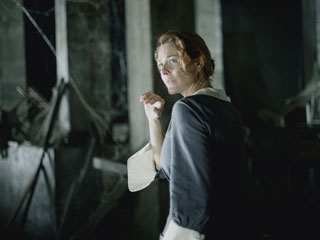The Orphanage
by M. Faust

The name of Guillermo del Toro looms large in the publicity for The Orphanage, Spain’s entry for consideration for Best Foreign Language Film. The title alone is enough to make you think that this may be the third part of a trilogy with del Toro’s two films about children and the supernatural, Pan’s Labyrinth and The Devil’s Backbone. And while del Toro is in fact only the producer and “presenter” of this movie by first-time director Juan Antonio Bayona, it its fairly well into his canon. Similar in tone to some of the wave of “J-horror” films from Japan, The Orphanage is set in a large, secluded seaside mansion. Abandoned for years, it was once an orphanage where a girl named Laura was happy until she was adopted. As an adult, she returns with her husband and young son, planning to re-open the building as a group home for sick and “special needs” children. But when her son begins to develop friends that only he can see, it opens up a past of secrets and guilt that may or may not actually exist. In the manner of The Innocents, The Others or Poltergeist, The Orphanage is a fright film that rests on the shoulders of a splendid actress, in this case Spanish star Belen Rueda. Faced with the tricky job of playing a complex character whose motivations and secrets are never entirely clear to us, she compels our attention right through the unsettling ending. You could spend all day playing “spot the reference”—scripter Sergio G. Sánchez owns up to The Omen, Rosemary’s Baby, The Tenant and Close Encounters of the Third Kind, and there are also nods to Friday the 13th and Flowers in the Attic—all of which seems more likely to alienate the arthouse audience for this than to attract the horror fans who will find it too cerebral. The same is true of a few overly gruesome shocks Bayona indulges in along with a catalogue of more subtly effective jolts. The Orphanage lacks the political subtext that gave del Toro’s films extra substance, but it’s made to order for audiences who like to be scared without being grossed out.
|
Issue Navigation> Issue Index > v7n2: The Nature of Nature (1/10/08) > Film Clips > The Orphanage This Week's Issue • Artvoice Daily • Artvoice TV • Events Calendar • Classifieds |









 Current Issue
Current Issue